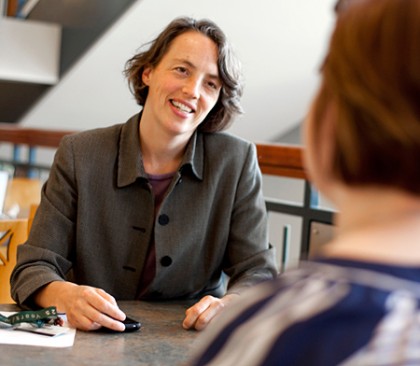The CAPABLE study is a community outreach research project created by Sarah Szanton, a faculty member at the Johns Hopkins School of Nursing, to facilitate aging in place. The study provides low-income older adults with resources to help them age safely in their homes. Sometimes it's something as simple as a strategically placed grab bar or a more secure banister.

Image caption: School of Nursing professor Sarah Szanton works with low-income older adults to help solve environmental challenges that are often as pressing as their health challenges.
Image credit: Will Mebane
NPR featured Szanton's study and examined some of the challenges older Americans face in their own homes as they age. With the over-65 population in the U.S. expected to more than double by 2050, with physician shortages anticipated, and with the cost of health care climbing, the type of in-home care Szanton is investigating figures to become more critical.
More from NPR:
Read more from NPRAlberta Hough struggles to feed herself a snack, her arms shaking badly from Parkinson's disease. Days earlier, the 84-year-old fell while eating, sliding off her kitchen chair.
The rest of Hough's day isn't much easier to navigate. She wobbles into a bathtub with no grab bar. Her feet catch on damaged floor tiles. Part of the banister she needs to steady herself on the stairs has pulled out of the wall. At the back door, a rickety wooden ramp no longer supports the scooter that helps her get around.
The environment in which you live can be as disabling as a disease, and too often, older Americans wind up in a nursing home not because they're super-sick but because they can't get through their days safely at home.
Now a major research project will bring handymen, occupational therapists and nurses into the homes of 800 low-income seniors in Baltimore to test if some inexpensive fix-ups and strategies for daily living can keep them independent longer, and save millions in taxpayer dollars spent on nursing home care.
"Very small changes can make a big difference," said Sarah Szanton, a Johns Hopkins University associate nursing professor who leads the project. "We're not saying, 'What's your blood pressure?' We're focusing on function: What do they want to do?"
Posted in Health, Politics+Society
Tagged aging, health care, sarah szanton








